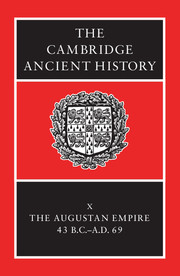3 - Augustus: power, authority, achievement
from PART I - NARRATIVE
Published online by Cambridge University Press: 28 March 2008
Summary
POWER
Rome's tradition of government, down to Iulius Caesar, was characterized by distributed power and multiple sources of decision. That was never to return. From 30 B.C. onwards, the whole Roman world found itself in the grasp of a single ruler, possessing all power and making all decisions, except insofar as he might choose to leave some of them to others. We are insistently bidden to penetrate behind the ‘façade’ to the ‘reality’ of Augustus' power, and some advantage is to be gained if, to begin with, we separate the power – its extent and sources and the functions it was used to accomplish – from the authority, which was the dress in which the power was clothed. But we must remember that such a separation is, in the long run, artificial, because, in the actual political life of a nation, power and its formalizations are inextricably linked, and where authority is entrenched recourse to power is unnecessary.
Tacitus, in a paragraph which, if its hostility of tone be discounted, remains the most masterly succinct statement of what Augustus did, writes thus: ‘… he laid aside the title of triumvir and paraded himself as consul and as content with the tribunician authority for looking after the commons. The soldiery he enticed with gifts, the people with corn, and all alike with the charms of peace and quiet; and thus he edged forward bit by bit (insurgere paulatim), taking into his hands the functions of Senate, magistrates, laws.’
- Type
- Chapter
- Information
- The Cambridge Ancient History , pp. 113 - 146Publisher: Cambridge University PressPrint publication year: 1996
References
- 13
- Cited by

